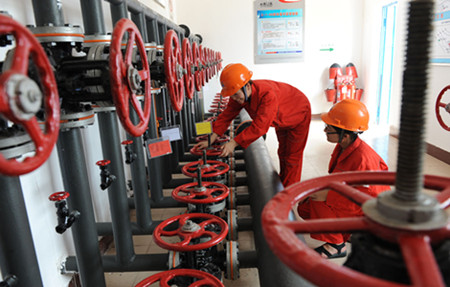BPEX aims to introduce petroleum price indexes
Updated: 2011-07-30 10:14
By Zhou Yan (China Daily)
|
|||||||||||
|
 |
|
Workers at the Shengli Oilfield in Dongying, Shandong province. China's ex-factory fuel prices are strictly controlled by the central government, which refers to the crude spot prices of Brent, Dubai and Indonesia's Cinta when adjusting fuel prices. [Photo/for China Daily] |
The oil bourse hopes to introduce the functions by the end of the year
BEIJING - Beijing Petroleum Exchange (BPEX) is planning to introduce its first price indexes for petroleum-related products by the end of the year. The move is aimed at underlining China's influence on oil pricing in the global market in the long run, a top executive from the oil bourse said on Friday.
BPEX, in which the nation's top energy company by output -China National Petroleum Corp (CNPC) - holds a 20 percent stake, has completed research on the price indexes for crude oil, gasoline and diesel, and gas (including liquefied natural gas and liquefied petroleum gas) and has finished designing models for the indexes and compiling methods of operation, said Wu Ruchuan, the chairman and president of BPEX.
"We will gradually introduce some indexes one after another this year based on the market demand," Wu said. However, he added that the bourse is unlikely to announce crude oil indexes in the short term, given the significance of the world's well-established oil benchmarks - North Sea Brent futures prices in Europe and West Texas Intermediate (WTI) futures prices in the Americas.
Wu said that the exchange will make the indexes barometers for China's oil market in the short term, and expand their impact to the international market when they mature. "There's a long way to go, and we have just taken the very first step," he said.
Currently, China's ex-factory fuel prices are strictly controlled by the central government, which refers to the crude spot prices of Brent, Dubai and Indonesia's Cinta when adjusting fuel prices, in accordance with the latest pricing system for gasoline and diesel introduced in 2008.
Under the new scheme, the National Development and Reform Commission (NDRC), China's top economic planner, will adjust fuel prices when international crude prices change more than 4 percent over 22 consecutive working days.
Despite this, the fuel price adjustments lag far behind the real changes in the three markets.
"At present, the NDRC is the only body that can determine the country's fuel prices. In this regard, it's not an easy job for BPEX to introduce indexes that can be used as guidance for traders and can heavily influence the market," said Wang Jintao, an analyst at chem365.net, an online information provider for the petrochemical industry.
However, the participation of the country's top oil companies, which have great influence on decision makers, will make the new indexes much more significant in terms of reference points for the market, Wang said.
According to Li Yun, vice-president of the exchange, apart from CNPC, the country's two other oil giants - China National Offshore Oil Corp and Sinochem Group, also hold stakes in BPEX.
As of June 30, BPEX's accumulative transaction volume reached 42.47 billion yuan ($6.5 billion), or approximately 180 million yuan in daily transactions, since it started official operations on Nov 2, 2010, according to the bourse. BPEX has 278 member companies at present.